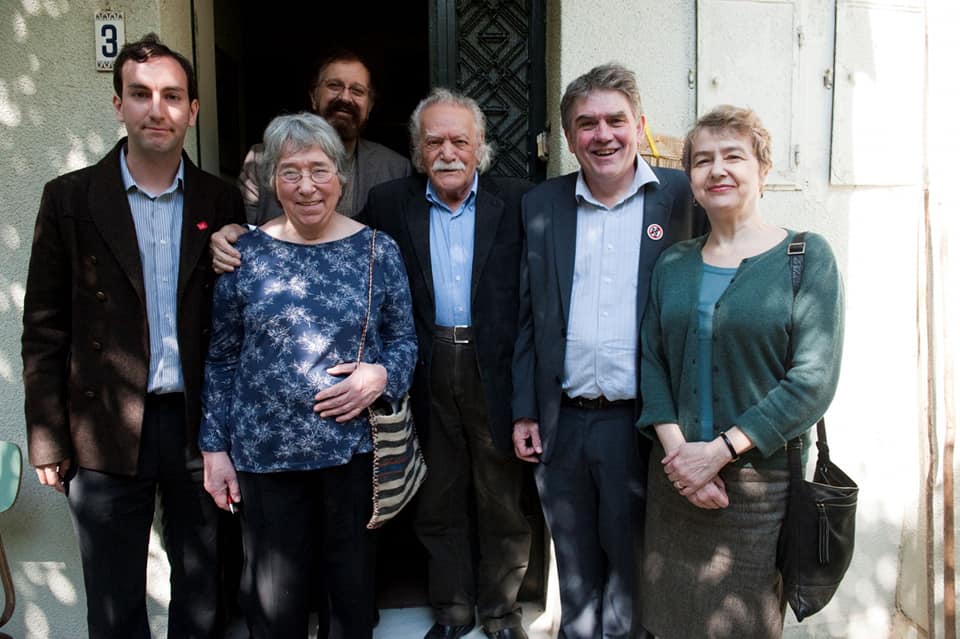
Manolis with the Greece Solidarity UK delegation 2012On the evening of Monday 30 March 2020, around 9 pm, one could hear people clapping their hands in many Greek neighborhoods. The clapping was followed by old partisans’s songs from the Resistance and in particular one called ‘Heroes’. In its lyrics one can find this line: ‘Heroes with twelve lives’.
If there was a person, that lived these ‘twelve lives’, this was Manolis Glezos, and the people clapping their hands in their balconies and shouting his name and playing old partisan songs were doing it to honor him, because today he passed away at the age of 98.
When Glezos was only 19 he made history, because along with his comrade Lakis Santas on the night of May 30/31 1941, just a few weeks after the Germans had entered occupied Athens, they brought down the Nazi flag from the Acropolis.
But this was just the beginning of eight decades dedicated to struggle. Active in the Resistance as a young communist, he would be arrested first by the Germans, later by the Italians and also by the Greek collaborators. His younger brother, Nicos, was executed by the Germans on May 1944. Glezos would always show the small note that his brother managed to write and throw out of the truck that was carrying him to the place of executions.
Manolis Glezos himself would be later condemned to death twice during the Civil War, but in 1950 his death sentences were commuted to life imprisonment. He would be liberated on 1954 only to be arrested again on 1958 on espionage charges and jailed until 1962 despite the international protests against the prosecution for such a symbol of the antifascist Resistance. After the 1967 Colonel’s coup he would be again arrested.
After the fall of the dictatorship he would not join any of the two Communist Parties that had emerged from the 1968 split and tried to revive EDA (United Democratic Left) which was the legal expression of the Left during the 1950s and 1960s. In the 1980s EDA cooperated with PASOK (and Glezos would be twice elected to parliament) but he would distance himself from PASOK. For some time he would be the elected president of his village in the island of Naxos, where he would try to experiment with forms of direct democracy. Active on the Left, in the 2000s he would participate in SYRIZA, being elected again to Parliament in 2012 and the European Parliament on 2014. When SYRIZA capitulated after the referendum, he distanced himself from SYRIZA and in the September 2015 election, he was a candidate with Popular Unity.
During all this time he would always be active in various movements. From the movement to demand German reparations to local struggles and movements of international solidarity. A prolific writer he would dedicate a large part of his energy to defending the history of the Resistance (writing a monumental two-tome history entitled ‘National Resistance 1940-1945), always available to speak at meetings at schools etc. He was also present in demonstrations and protests. On March 2010, during one of the first mass rallies against austerity riot police sprayed him with tear gas with the Minister of Public Order being forced to condemn such practices. During the mass movement of the Squares he was also there speaking to crowds.
During the trial of Golden Dawn he was also there, reminding of the continuity of antifascist struggle.
However, just referring to Glezos’s political trajectory cannot explain the place he had in the collective thinking of many generations. Glezos was never just a ‘living symbol’. He was more like living history, history in the making, history in the present. One is really impressed to see how many people, of many different generations, actually had personal memories of meeting Glezos in one moment or the other.
It is as if he represented the continuity of a spirit of struggle, the red line of commitment, courage and sacrifice, from the Resistance and the Civil War to contemporary movements.
And whatever disagreements one might had with Glezos on one issue or the other, he was living proof of the ‘new humanity’ that the Communist movement had envisaged and projected: always committed but also open-minded, eager to experiment, insisting on the broadening of democracy, trying to avoid dogmatism and bureaucratic mentality.
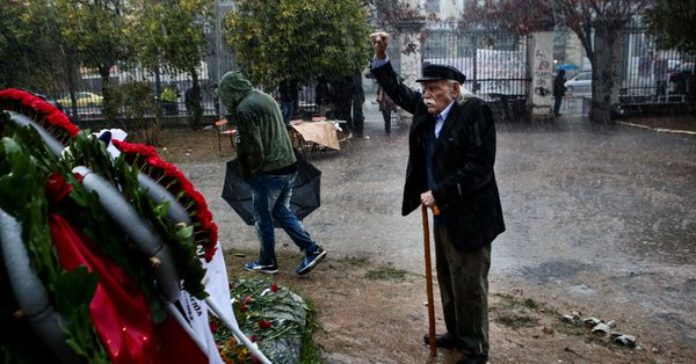
Manolis Glezos pays tribute to the dead of the 1973 Students’ Uprising at the Polytechnic University in downtown Athens.
It is not that he represented a particular line or program. He represented a spirit of struggle and resistance in a society that in the past ten years went from insurrection and hope to capitulation and defeat. A spirit of resistance and struggle most needed now.
Because of the restrictions imposed of the pandemic Glezos’s funeral will not be a mass demonstration as we would have wished. But tonight’s salute to the ‘last partisan’ made evident the place he has in our collective memory, feeling and thinking.
Panagiotis Sotiris
]]>The festival line up included internationally known performers who oppose racism and discrimination such as Gogol Bordello, Skunk Anansie, Ziggy Marley, and Prophets of Rage. The last band includes former members of Rage Against The Machine, Audioslave, Public Enemy and Cypress Hill.
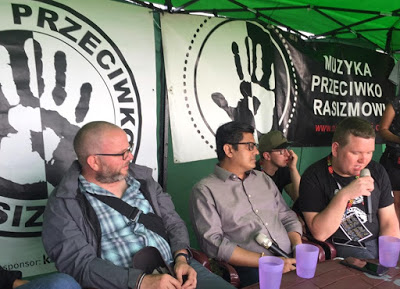 The festival stand of the ‘NEVER AGAIN’ Association was the venue of a debate with Nay San Lwin, a human rights activist and representative of the persecuted minority of Rohingya in Myanmar (Burma). For years he has been drawing the attention of world public opinion to the genocidal practices used by the military dictatorship against the Rohingya, such as violence, hunger and forced evictions. The genocide in Myanmar has been documented by the United Nations. The other participants of the debates organized by ‘NEVER AGAIN’ included members of Opferperspektive (Victim’s Perspective), a German organization which helps the victims of hate crimes, as well as activists from Denmark, Moldova, and Belarus.
The festival stand of the ‘NEVER AGAIN’ Association was the venue of a debate with Nay San Lwin, a human rights activist and representative of the persecuted minority of Rohingya in Myanmar (Burma). For years he has been drawing the attention of world public opinion to the genocidal practices used by the military dictatorship against the Rohingya, such as violence, hunger and forced evictions. The genocide in Myanmar has been documented by the United Nations. The other participants of the debates organized by ‘NEVER AGAIN’ included members of Opferperspektive (Victim’s Perspective), a German organization which helps the victims of hate crimes, as well as activists from Denmark, Moldova, and Belarus.
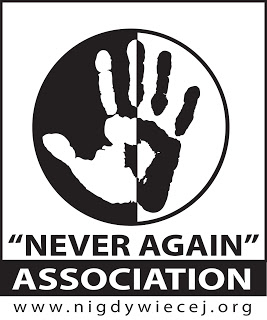 Poland’s Civil Rights Ombudsman Adam Bodnar also participated in a meeting organised by the ‘NEVER AGAIN’ Association during the festival. Mr Bodnar spoke about the recent cases of homophobic violence in Poland. Furthermore, the ‘NEVER AGAIN’ Association organized a football tournament promoting the message of ‘Let’s Kick Racism out of the Stadiums’ among the festival participants. On 2 August, the group’s members played a match with the Ombudsman’s team led by Adam Bodnar himself.
Poland’s Civil Rights Ombudsman Adam Bodnar also participated in a meeting organised by the ‘NEVER AGAIN’ Association during the festival. Mr Bodnar spoke about the recent cases of homophobic violence in Poland. Furthermore, the ‘NEVER AGAIN’ Association organized a football tournament promoting the message of ‘Let’s Kick Racism out of the Stadiums’ among the festival participants. On 2 August, the group’s members played a match with the Ombudsman’s team led by Adam Bodnar himself.
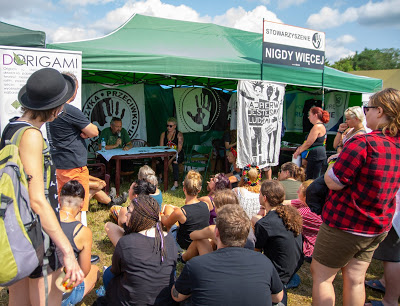 During the festival days ‘NEVER AGAIN’ organized many other educational activities, including public discussions with numerous musicians involved in its ‘Music Against Racism’ campaign and an anti-fascist quiz with the ‘Naprzod’ (Forward) Foundation. The anti-racist educational activity during the festival was supported by Studio K2, the Fare network, and the Warsaw-based Rotary Club Goethe.
During the festival days ‘NEVER AGAIN’ organized many other educational activities, including public discussions with numerous musicians involved in its ‘Music Against Racism’ campaign and an anti-fascist quiz with the ‘Naprzod’ (Forward) Foundation. The anti-racist educational activity during the festival was supported by Studio K2, the Fare network, and the Warsaw-based Rotary Club Goethe.
The ‘NEVER AGAIN’ Association is an independent organization established in Warsaw in 1996. ‘NEVER AGAIN’ has campaigned against racism, antisemitism and xenophobia, for peace, intercultural dialogue and human rights both in Poland and internationally.
More info:
www.nigdywiecej.org
www.facebook.com/Respect.Diversity
www.twitter.com/StowNIGDYWIECEJ
* If you would like to support ‘NEVER AGAIN’ please contact [email protected]
]]>From every corner of the world came sailing, The 5th International Brigade. They came to stand beside the Spanish people to try and stem the rising fascist tide.
Lyrics
Ten years before I saw the light of morning
A comradeship of heroes was laid
From every corner of the world came sailing
The Fifth International BrigadeThey came to stand beside the Spanish people
To try and stem the rising fascist tide
Franco’s allies were the powerful and wealthy
Frank Ryan’s men came from the other side
Even the olives were bleeding
As the battle for Madrid it thundered on
Truth and love against the force of evil
Brotherhood against the fascist clan
CHORUS
Viva la Quinta Brigada
“No Pasaran”, the pledge that made them fight
“Adelante” is the cry around the hillside
Let us all remember them tonight
Bob Hilliard was a Church of Ireland pastor
Form Killarney across the Pyrenees he came
From Derry came a brave young Christian Brother
Side by side they fought and died in Spain
Tommy Woods age seventeen died in Cordoba
With Na Fianna he learned to hold his gun
From Dublin to the Villa del Rio
Where he fought and died beneath the blazing sun
CHORUS
Many Irishmen heard the call of Franco
Joined Hitler and Mussolini too
Propaganda from the pulpit and newspapers
Helped O’Duffy to enlist his crew
The word came from Maynooth, “support the Nazis”
The men of cloth failed again
When the Bishops blessed the Blueshirts in Dun Laoghaire
As they sailed beneath the swastika to Spain
CHORUS
This song is a tribute to Frank Ryan
Kit Conway and Dinny Coady too
Peter Daly, Charlie Regan and Hugh Bonar
Though many died I can but name a few
Danny Boyle, Blaser-Brown and Charlie Donnelly
Liam Tumilson and Jim Straney from the Falls
Jack Nalty, Tommy Patton and Frank Conroy
Jim Foley, Tony Fox and Dick O’Neill
CHORUS
]]>Source: The Guardian
Across the country many Muslim communities are feeling anxious about the safety of our families and children, and our friends.
Friday marks one week since the terrorist atrocity in New Zealand in which a 28-year-old Australian man published an online white supremacist “manifesto”, and then went into two mosques in Christchurch with multiple firearms, opening fire and killing 50 Muslims as they prayed. Nobody was spared from his Islamophobic massacre, not even children. One of the youngest casualties was three-year-old Mucad Ibrahim who was at the mosque with his family.One week on, the implications of those terrorist crimes in New Zealand are having a profound and deep impact on Muslim communities across the world, including here in the UK. Many of us are traumatised. Many of us feel horrified. We are devastated. We are broken and we are terrified.
This morning West Midlands police have confirmed their counter-terrorism team is investigating attacks on five mosques in Birmingham damaged by sledgehammers overnight. According to local media reports one mosque in the city was attacked this morning – the windows were smashed. The motivation behind these attacks is not clear but these attacks are designed to increase Muslim fears of vulnerability.
We know that many in our communities, people of faith and no faith alike, feel a deep sense of shock and horror, and there have been many moving and kind individual and community acts of solidarity, sisterhood and brotherhood across the country. Our mosques have been showered with flowers and handwritten messages of solidarity, and cards filled with children’s handwriting.
On Monday I was invited by a group of young activists and community organisers to attend a vigil for New Zealand outside News Corp’s headquarters near London Bridge. News Corp is the Rupert Murdoch-owned media company that publishes newspapers such as the Sun.
Outside the towering glass building, a woman from the Inclusive Mosque Project recited the Islamic call to prayer, the adhan, and recited the prayer Muslims read for the deceased’s soul to rest in eternal peace. The crowd joined her in calling for unity, peace and justice for the victims. We also heard from a young man who had lost his uncle and cousin – gunned down in one of the two mosques attacked in Christchurch. He spoke movingly about how proud he was of his loved ones and how he will hold on to that pride for the rest of his life. I, along with others, was asked to read out the names of the victims and what we knew of them.
What struck me most was how uniquely each life was connected to New Zealand from other parts of the world: Bangladesh, Pakistan, Palestine, Egypt and elsewhere. We mourn for every life lost, for who they were and for who they never had the chance to become.
Alongside poignant and reflective vigils and random acts of kindness, there has also been a spate of hate crimes reported across the UK, including here in Oxford, where I’m a Labour city councillor. Swastikas and references to the far right and New Zealand were sprayed on the wall of my former school in Oxford, and a Muslim woman reported an incident of a man making shooting sounds as she walked to work. Police have questioned two teenagers over the graffiti. Students at Cheney school disgusted by the racism are designing a mural to celebrate diversity, fearing that the wall would be “haunted by the words” if left blank. In Surrey a 19-year-old man was stabbed in what police suspect was a far-right-inspired terror attack.
Across the country many Muslim communities are feeling anxious about the safety of our families and children, and our friends. To be clear, this anxiety is a constant, we live in the shadow of Islamophobia and in a context where reported hate crime and incidents of racism are on the increase. One young woman I met this week described it as “living in a constant state of low-level anxiety. Being a Muslim woman I feel vulnerable all of the time but especially after a terrorist attack anywhere in the world. It’s a form of post-traumatic stress disorder, except we are living the trauma here and now.”
We are almost six weeks away from the start of Ramadan in early May. This is the busiest time of the year for mosques, with people often travelling from afar to attend special prayers and to break fast in the mosque. Most mosques in the UK are open places of worship – other than during the five prayer times mosques are community spaces where children learn the Qur’an and community activities take place.
In 2017 Muslims were targeted in an attack on a mosque in Finsbury Park, London, when far-right extremist Darren Osborne rammed a van into worshippers leaving Ramadan prayers.
After New Zealand and following calls by the Muslim Council of Britain and other Muslim organisations to strengthen measures to protect Muslims and our mosques, the Home Office has doubled an annual fund for protective security at religious institutions.
However, groups must individually bid for chunks of the £1.6m funding, which is also – and rightly so – open to Christian churches, Hindu temples, Sikh gurdwaras and other places of worship. Security for Jewish communities is separately awarded £13.4m via the Community Security Trust; Muslim groups are calling for equivalent support.
For some in the Muslim community having a heightened police presence around mosques is not the solution. As a community who are overly policed, the feeling is that mosques should organise their own network of security patrols. Meanwhile, others want to see an increased and visible police presence, at a time of dwindling police resources and numbers.
New Zealand has shown all of us once again that we must not be complacent about the real danger and threat the far right pose to minorities and to the fabric of our society.
• Shaista Aziz is a Labour city councillor in Oxford, journalist and writer. She was a keynote speaker at the conference ¡No Pasaran! Confronting the Rise of the Far Right, attended by delegations from across Europe in London on 2 March 2019.
Source: The London Economic
The extreme far right now commands an electorate of over 22 million across Europe. From 1999 to 2014, the share of seats of extreme right-wing- and neofascist parties in the European Parliament has more than doubled from 11% to 23%, and they are projected to be the second largest bloc in the May 2019 elections.
Is Europe under threat from the biggest rise of the far right since the 1930s? On 2 March 2019, Walter Baier of Transform! Europe addressed the ¡No Pasaran! conference on the rise of far right extremism – named after the Spanish anti-fascist cry of the 1930s ‘They shall not pass’. His sobering speech – reproduced below – makes a chilling read.
Throughout last year, the biotope of modernised, right-wing extremist parties in Europe has spread virally.We are not speaking about violent, militant fringe groups but rather about parties who found their way to the command heights of states.
The experiences in Hungary, Poland, Austria and elsewhere make clear the antidemocratic character of these parties, which, once in government, infiltrate the state apparatus in order to take precautions against their being deprived of power again.
Should we use the term “Fascism” to label these parties, well-aware of the strong historical associations this term evokes?
You can also ask from the point-of-view of tactics, whether it makes sense to emphasise and give prominence to the objectively existing continuity between present-day right-wing extremist parties and historical Fascism.
What we have to consider, however, is that we must not look at historical Fascism exclusively with the knowledge of those born into a later generation, but we must also ask what contemporary theoreticians such as Arthur Rosenberg, Otto Bauer, Antonio Gramsci, Walter Benjamin, Friedrich Polock or Leo Trotsky had in front of their eyes when describing the rise of Fascism.
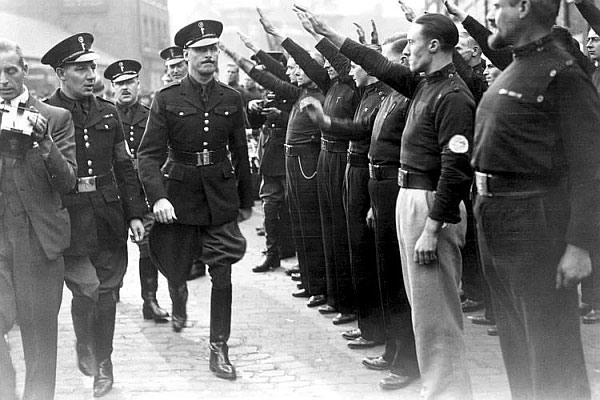
The phenomena they were analysing in a terrifying way resemble what the mainstream of empirical political science today calls “right-wing populism”.
Critical theoreticians such as Hannah Arendt and Karl Polyani agreed with the Communist Left on the point that Fascism was the political answer of one part of the bourgeois class to the crisis of liberal democracy.
Thus, Walter Benjamin wrote in 1936, “Fascism attempts to organize the newly created proletarian masses without affecting the property structure … Fascism sees its salvation in giving these masses not their right, but instead a chance to express themselves.”[1]
And Karl Polanyi adds, “Fascism, like socialism, was rooted in a market society that refused to function.“ And, he continues, “The fascist solution of the impasse reached by liberal capitalism can be described as a reform of market economy achieved at the price of the extirpation of all democratic institutions, both in the industrial and in the political realm.“[2]
However true it is that we cannot effectively fight modernised, right-wing radicalism with slogans, language and symbols of the Interwar period, it is equally true, on the other hand, that the radical, neofascist, populist or otherwise right-wing parties’ grab for power can only be understood in the context of capitalist property and dominance relations.
In this sense I would like to present for discussion the following five theses:
- The extreme right-wing parties want to establish an authoritarian state. For that reason, it is appropriate to speak of Neofascism.
- In several countries Neofascism has made its way into the heart of societies and in some others, it has shifted the agenda also of traditionally conservative parties to the Right.
- The crisis has produced a fertile breeding ground for this. But, only its interpretation within the framework of the patterns of meaning provided by Neoliberalism make entire populations vulnerable to Neofascism.
- The rise of Neofascism is a European phenomenon finding its expression in transnational party formations in and outside the European Parliament.
- The paradox of a nationalist International is resolved in that conflicting nationalisms of moderate and radical parties of the Right have found a common vanishing point in their opposition to the European Union.
Right-Wing Extremist Parties and the State
Seven weeks after the elections that led to an absolute majority of PiS in the Polish Sejm, Die Zeit published an article headed “How a New State Is Emerging”, in which it said that “step by step the new government is rebuilding Poland into a right-wing nationalist state.”
Since then the PiS-government has done its best to meet the expectations, trying to get control over the decisive power positions in the state, for instance, by its effort get a grip on the supreme court, which caused the European Commission to initiate infringement proceedings against Poland half way through last year. Meanwhile the government is trying to get under control as completely as possible public opinion by supervision of the media, censorship measures and politically motivated dismissals.
Similarly must be reported from Hungary, where FIDESZ in 2012, enacted a ‘Basic Law’, which starts with a national avowal to the ethnic-cultural nation of Hungary, thus defining the frame of legislation and administration, e.g., by distinguishing general human rights from civic rights, which remain the privilege of Hungarians inside and outside the boarders of the country.
In Austria, the Freedom Party (FPÖ), which is a nationalist party, however not faithful to its country but to a unified Great-Germany, is now in charge of the command over police, army and all secret services. While the FPÖ is creating a ‘deep state’ under their control, powers to overrule are established everywhere, from the National Statistics Institute to the Public Broadcasting Service.
In all these cases, there is no reason to presume innocence.
Wherever right-wing radical parties become members of governments, they act according to the principle: tolerate not more democracy than necessary but enforce as much authoritarianism as possible.
The Struggle for Interpretation in the Heart of Societies
Not merely theoretically, but also empirically, that is, on the basis of the politics pursued by right-wing radical/neofascist parties, it can be demonstrated that they are parties of the capitalist elites. Chasing them away from power requires mobilising the majorities in our societies for democracy.
This is the reason why it is important to see who the voters for neofascist parties are.
Mainstream political science answers the question by referring to the high votes for neofascist parties among the working class. The typical voter is portrayed as male, white, with low-income and level of education, typically at home in industrial regions on the decline, outside urban conglomerations.
From here, the road is short to considering Neofascism a phenomenon spreading only in the lower classes. This leads straight to the so-called “populism-thesis” according to which populists are dividing the population into “corrupt elites” and a “good, clean people”.
But populists address the people in a special way, namely through the medium of the reactionary prejudice or, as Adorno has shown in his study about the authoritarian character, through “antidemocratic resentment”, which is not contrary to the neoliberal world view but forms an inherent part of it.
This is the reason why the discursive cleavage in the political field between Right and Left continues to be important. This can be illustrated by data from the first ballot of the French Presidential Elections (2017) where the votes of blue- and white-collar workers were polarised between Marine Le Pen (39% resp. 30%) and Jean-Luc Mélenchon (24% resp. 25%)[3].
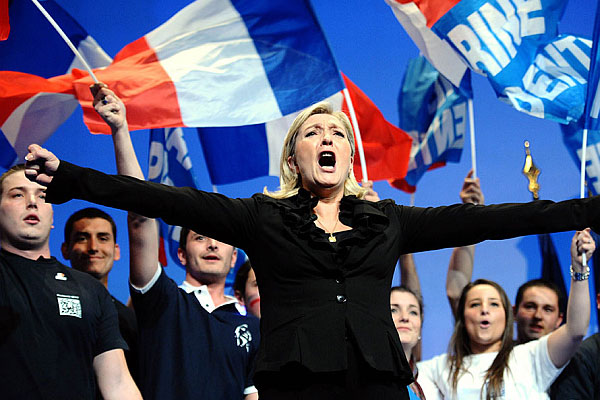
Marine Le Pen – leader of far right Front National
Contrary to the thesis upheld by main-stream political science that populism evades being assigned to either Left or Right, 70% of voters for Mélenchon identified themselves as “left”, while 63% of Le Pen voters called themselves “right” in post electoral surveys. This is even confirmed by the decisive motives the interviewees expressed, which were the classical topics of the Left such as social security, health care and an increase in mass purchasing power on the one hand, the topics of the Right such as the fight against terrorism, protection against crime and criminality on the other[4].
A European Phenomenon
It is no longer possible to analyse the spreading of the extreme right-wing biotope in different countries as parallel phenomena that are independent of each other. It is a European phenomenon. From 1999 to 2014, the share of seats of extreme right-wing- and neofascist parties in the European Parliament has more than doubled from 11% to 23%.
According to the most recent projections, the extreme right-wing parties can expect 25% of seats in the upcoming elections in May, which would make them the second largest bloc.
This clearly shows that the kind of nationalism as embodied by the extreme right-wingers and neofascists has become an alternative, reactionary concept not only as the restructuring of states is concerned but also with regard to Europe as a whole.
In the incumbent European Parliament the extreme right-wing spectrum is split into three fractions. Of these, the most dynamic force of uniting the extreme right-wing parties is the fraction of the neofascist Right “Europe of Nations and Freedom” (ENF), embracing the Rassemblement National, the Freedom Party, the Northern League, the Congress of the New Right (Poland), the Czech SPD, the Party for Freedom (PVV) and Vlaams Belang.
The Charta of the ENF contains in admirably frank and precise words the following,
“[T]he parties and the individual MEPs of the ENF Group base their political alliance on the sovereignty of states […] The opposition to any transfer of national sovereignty to supranational bodies and/or European Institutions is one of the fundamental principles uniting Members of the ENF […] They base their political alliance on the preservation of the identity of the citizens and nations of Europe […] The right to control and regulate immigration is thus a fundamental principle shared by the Members of the ENF Group.“[5]
The rejection of the EU in the name of “national sovereignty” and ‘immigration control’ is the common position of all these right-wing extremist parties.
It would be fatal for the Left to join in the game of nationalism, precisely because European integration finds itself in a crisis. A collapse of European integration – quite thinkable today – would be positive only if we thought that there was anything better to come, if we supposed that the great problems our societies are facing – such as globalised financial markets, migration, development, climate change, security – could be solved in a better way within a Europe of 28, 35 or 50 national currencies, nation states and border regimes.
However, if that is not the case, the consequence is to defend peaceful European integration against nationalism. But, no less important is to take into account that, accepting uncritically the status quo of the current EU and her politics, this cannot succeed but that it is necessary to fight for a radical social, ecological and democratic reformation of the EU.
To come back to the question: Is it possible to speak, in a scientific sense, of a fascist danger in Europe today?
My answer is ambivalent. Not long ago, a friend wrote to me on Facebook, saying “The light we can see in the tunnel only comes from the entrance behind our backs. It can disappear with the next curve. We need to be alert!”
This article also appears in the next edition of Transform Magazine. To find out more about Transform! Europe: www.transform-network.net/
NOTES
[1] Benjamin, Walter (1963): Das Kunstwerk im Zeitalter seiner technischen Reproduzierbarkeit, Frankfurt am Main, S. 42; engl.: http://kunstistkrieg.blogspot.com/2014/07/walter-benjamin-war-and-aesthetics.html
[2] Polanyi, Karl (1944): „ The Great Transformation. Politische und ökonomische Ursprünge von Gesellschaften und Wirtschaftssystemen. Wien 1977, S, 317; engl.: http://inctpped.ie.ufrj.br/spiderweb/pdf_4/Great_Transformation.pdf, p. 248, 245.
[3] Source: Ifop et Fiducial, Le profil des électeurs et le clefs du premier tour de l’ élection présidentielle, 23 Avril 2017
[4] Ibid.
[5] Cf. Charter of the ENF-Group, https://www.enfgroup-ep.eu/about/